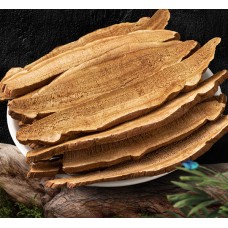China Lingzhi Tea,Ganoderma Lucidum Herb,Ling zhi
Ex Tax: $17.99
Name: Reishi mushroom (Ling zhi)
Origin : China
Grade : Good
Stockpiling :Sealed packaging OR Refrigerator freezer room. Dry and no direct sunshine.
Reishi mushroom (Ling zhi) |
|
|
| Reishi is a mushroom commonly used in traditional Chinese or traditional Japanese medicine, with the botanical name Ganoderma lucidum. Its Chinese name is Lingzhi. Reishi grows in six different colors, but the red variety is most commonly. Reishi is a large, dark, very tough, woody/corky mushroom. It has a brown cap with distinctive semicircular growth rings. Reishi mushrooms are kidney-shaped and grow to 8 in (20 cm) or more in diameter. They grow in moist and temperate forest areas of Asia, Europe, South America, and the United States. In nature, they grow in densely wooded mountains of high humidity and dim lighting. It is rarely found since it flourishes mainly on the dried trunks of dead plum, guercus serrata or pasonia trees. Out of 10,000 such aged trees, only 2 or 3 will have reishi growth, therefore its wild form is generally rare. Most mushrooms are around 90% water, while reishi is around 75% water. Reishi has a long history of medicinal use over hundreds of years with recent research supporting its usefulness. |
Active constituents of reishi |
|
|
| Reishi contains sterols, coumarin, mannitol, alkaloids polysaccharides, mannitol lactones, organic germanium, adenosine, amino acids, and triterpenoids called ganoderic acids. Reishi also contains ergosterols, complete proteins, unsaturated fatty acids, vitamins and minerals. Reishi is the only known source of a group of triterpenes known as ganoderic acids, which have a molecular structure similar to steroid hormones. It has the most active polysaccharides among medicinal plant sources. Ganoderic acids may lower blood pressure ands decrease LDL cholesterol. |
Medicinal uses and health benefits of reishi mushroom |
|
|
|
Reishi mushrooms have a long history of medical uses. Reishi had been recorded as having the most extensive and effective healing powers. In Traditional Chinese Medicine (TCM), reishi is indicated for the treatment of coronary heart disease, bronchial
Reishi has been claimed to be anti-allergin, antioxidant, analgesic, antifungal, anti-inflammatory, antitumor, antiviral, antiparasitic, cardiovascular, antidiabetic, immunomodulating, hepatoprotective, hypotensive and hypertensive, kidney and nerve tonic, and sexual potentiating. Reishi is used to treat a variety of disorders and promote vitality; it works as an antioxidant against free radicals, protects against the effects of radiation and has anti-inflammatory effects. Reishi intensifies the body's free radical scavenging ability and is especially effective against harmful hydroxyl radicals. Reishi is such a strong hydroxyl radical scavenger that its actions continue even after it is absorbed and metabolized. Reishi is recognized to play a role in preventing spontaneous death in cancer patients. Reishi reinforces membrane of the cancerous cell to impede spreading. It also prevents thrombi formation aiding in fusion of medications within the system. Joint usage with other anti-tumor drugs and chemotherapy diminishes their side-effects and heightens their effect. It normalizes the overall body system thus decreases further health complications. Reishi's ability to inhibit thrombi formation with none of the side effects of modern medication proves to be invaluable contribution in the fight against cancer. Reishi is known as a cardiotonic herb due to its ability to improve blood flow and reduce oxygen consumption in the heart muscle. Reishi eliminates cholesterol build-up and promotes blood circulation. Regular use of this mushroom helps regulate cholesterol levels and platelet activity in the bloodstream. The mushroom's active ingredients, called ganoderic acids, appear to combat high blood pressure and reduce LDL cholesterol and triglyceride levels. They may also discourage blood platelets from clumping together, thus reducing the risk of dangerous clots. The mycelium of reishi contains high levels of polysaccharides, which have been shown in research to induce the production of interferon. Interferon is a protein produced inside cells to fight viral infection. Polysaccharides are also tumor fighters and help stimulate the immune system. Reishi is also an adaptogen, with properties similar to ginseng. The adenosine relaxes skeletal muscles, calms the central nervous system and operates against the stimulating action of caffeine. Reishi activates the body's immunity system, increasing one's ability to fight against diseases, but it can also arrest the excessive production of allergen to regulate overall functions in the system. |
Write a review
Your Name:Your Review: Note: HTML is not translated!
Rating: Bad Good
Enter the code in the box below:




